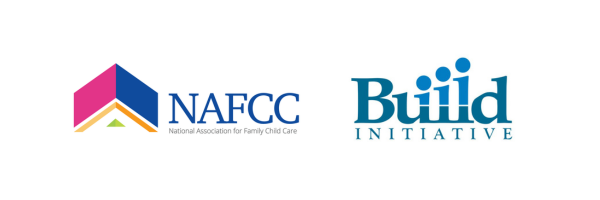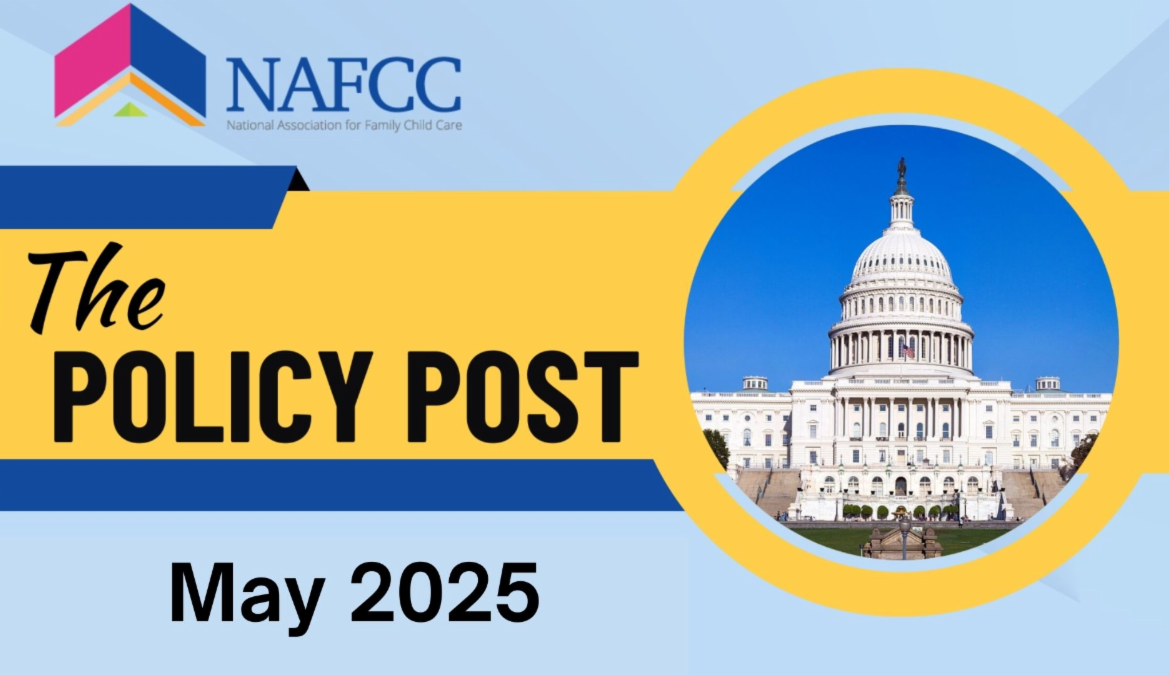
A Message from Our Policy & Public Affairs Director
Dear Family Child Care Advocates,
This spring, we’ve seen the power educators have when they speak up—and when decision-makers ignore us. While the Trump administration threatens programs like Head Start, and Congress debates cuts to Medicaid and food assistance, states like Alabama, Florida, and Washington are quietly proving that another way is possible. A way that respects your experience. A way that invests in your business. A way that sees family child care as essential.
These victories didn’t come by chance. They were the result of educators organizing, testifying, and standing together. That’s the spirit behind this newsletter. Whether you’re reading about tax credits, training policy updates, or debates over the federal budget, we want you to see yourself in this work. You deserve policies that reflect your values, and we’re here to help make that vision a reality.
With gratitude,
Ronald Jarrett, J.D.
Director of Policy and Public Affairs
National Association for Family Child Care (NAFCC)
NAFCC’s Three Key Policy Priorities for 2025
Pocketbook Issues: Ensuring Financial Security for FCC Educators
- Advocating for fair wages, sustainable funding, and access to health insurance.
- Fighting against policies that disproportionately benefit center-based programs while leaving FCC educators behind.
Strengthening the FCC Ecosystem in Times of Crisis
- Addressing challenges posed by climate disasters, immigration barriers, and funding instability.
- Ensuring FCC educators have access to emergency relief funding, disaster preparedness resources, and clear pathways for navigating immigration-related workforce challenges.
Expanding Recognition of NAFCC Accreditation at the State Level
- Pushing for widespread adoption of NAFCC Accreditation standards.
- Ensuring accreditation is recognized as a professional benchmark that leads to financial incentives, subsidy eligibility, and workforce advancement.

Policy Updates
House Budget Committee Rejects GOP Reconciliation Bill Amid Internal Divisions
In a notable development, the House Budget Committee voted 16–21 to reject the Republican-backed reconciliation bill, a comprehensive 1,116-page proposal known as the “One Big Beautiful Bill Act.” The legislation aimed to propose significant reductions in federal spending, notably targeting Medicaid and the Supplemental Nutrition Assistance Program (SNAP), with projected cuts of approximately $1.5 trillion. The Congressional Budget Office estimated that these changes could result in 8.6 million people losing health coverage over a decade. The bill also included provisions such as stricter work requirements for Medicaid recipients and the introduction of out-of-pocket fees for certain beneficiaries.
Why it Matters: The proposed reconciliation bill’s significant cuts to Medicaid and SNAP are of particular concern to family child care educators. Many educators and the families they serve rely on these programs for essential health care and nutritional support. Reductions in Medicaid funding could lead to decreased access to medical services for children and caregivers, while cuts to SNAP may increase food insecurity among low-income families. Furthermore, the introduction of stricter work requirements and out-of-pocket fees could place additional burdens on both educators and families, potentially affecting enrollment and the overall well-being of children in care. Staying informed about these policy developments is crucial, as they directly impact the resources and support systems that underpin the family child care community.
Head Start Under Threat: Trump Administration Moves Undermine Program Stability
Although the Trump administration’s most recent budget proposal is flat-funding, the threat to the program remains very real. According to HHS Secretary Robert F. Kennedy Jr., the administration is proposing to fund Head Start at FY2025 enacted levels—but only if the program aligns with its political priorities. In practice, this has already meant disruption: temporary freezes and delays in routine funding have led to confusion, temporary closures, and even staff layoffs. The administration has also gutted the infrastructure that supports Head Start, firing key federal personnel and closing five regional offices. In March, programs were instructed to halt spending on diversity, equity, and inclusion (DEI) activities—despite federal law requiring inclusive services for children from diverse backgrounds and those with disabilities. Litigation from the ACLU is now underway, arguing these actions represent an illegal dismantling of a vital program serving nearly 800,000 children.
Why it Matters: Family child care educators are a crucial part of the early care and education ecosystem that Head Start supports. Whether you’re directly connected to Head Start or work with families who rely on its services, instability in the program affects your community. When funding is delayed or offices are shuttered, local programs are left in the dark—facing layoffs, lower quality care, or even closures. And the attack on DEI is not just symbolic—it threatens inclusive practices that ensure children of all races, abilities, and backgrounds receive the high-quality care they deserve. FCC educators must stand with our Head Start colleagues and urge Congress to restore staffing, reopen federal regional offices, and guarantee timely, full funding without political strings. Our children and families cannot afford anything less.
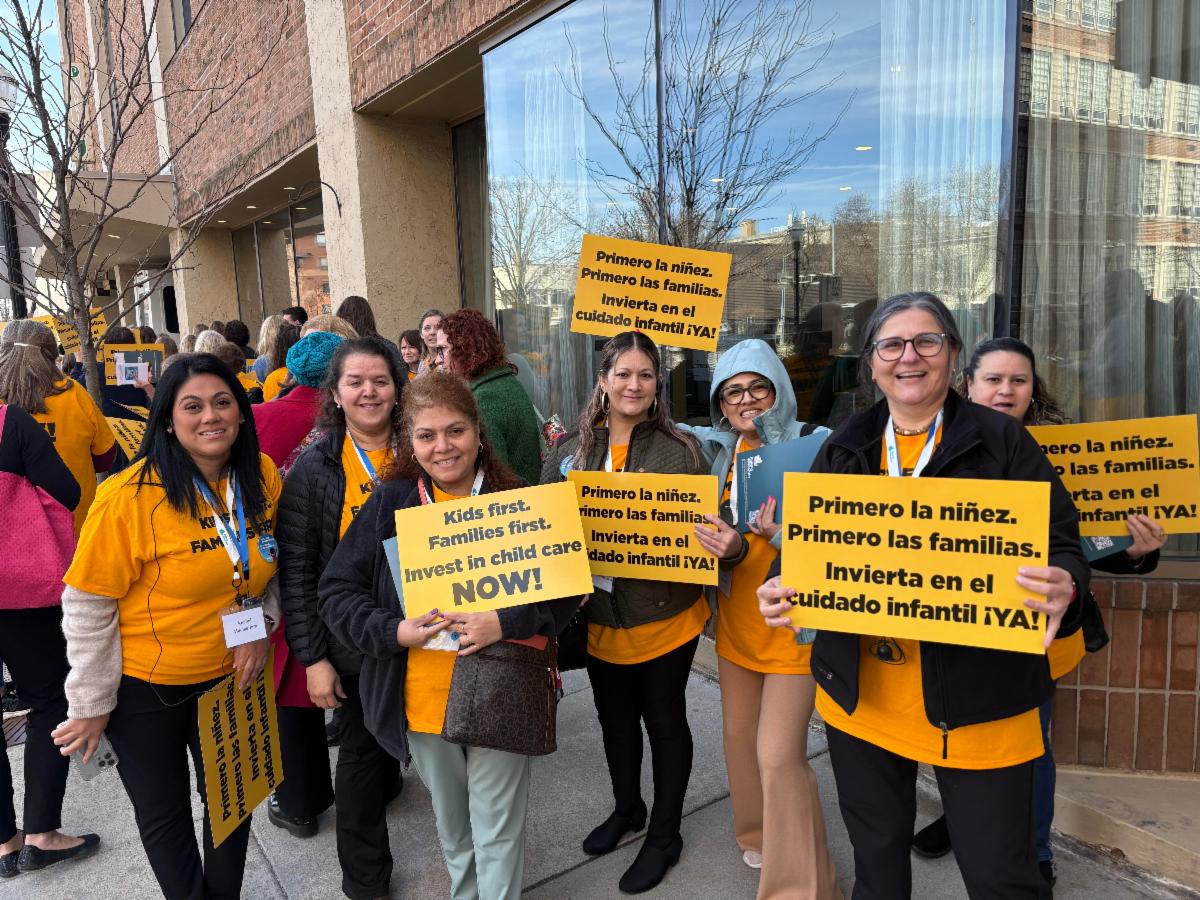
State Policy Watch
Select 2025 State Policies for Family Child Care Educators
Across the country, state legislatures are making important decisions that directly impact family child care educators—some offering new opportunities, others introducing new requirements. In this edition, we’re highlighting three recently passed laws from Florida, Washington, and Alabama that support educators by reducing red tape, honoring experience, and boosting financial stability. These are just a few examples of how state policy can strengthen the early care workforce. We know there’s more happening across the country—we want to hear from you. If you know of a new law or budget win in your state that affects your program, email us and let us know. Your voice helps shape our advocacy.
Florida – SB 738 (Child Care and Early Learning Providers)
What it does: In Florida, SB 738 was passed unanimously in April 2025 to support child care educators and streamline regulations. This new law requires the Department of Children and Families to offer free online training and certification exams for new child care workers, and it allows a 45-day provisional hiring period so staff can start working under supervision while awaiting background check results. It also modernizes licensing rules – for example, programs with strong compliance records can get abbreviated (streamlined) inspections instead of the full routine, reducing unnecessary visits. Notably for home-based educators, the law formally recognizes a “large family child care home” license category in statute (for educators caring for more children in their home) and updates old terminology to “family child care homes” to reflect current practice. (Effective July 1, 2025.)
Why it matters: These changes directly help family child care educators by cutting red tape and supporting the work. The free, online initial training and quicker background screening mean family child care home operators can hire assistants or substitutes faster and at lower cost, which is crucial when needing extra hands. The option of shorter inspections for programs with good track records could be a relief from lengthy inspections. Finally, officially recognizing large family child care homes in the law is a win: it allows experienced educators to expand capacity and be acknowledged as a distinct part of the child care system.
Washington – HB 1648 (Child Care Provider Qualifications)
What it does: In Washington State, the Fair Start for Kids Act set ambitious education requirements for child care workers – but a 2025 fix, HB 1648, just passed with unanimous support to give educators more flexibility. This new law extends the deadline for meeting advanced training or credential requirements by six more years (until August 2032, instead of 2026). It recognizes that experience matters: any educator with at least five years of hands-on experience now counts as having met the competency requirements – educators won’t be forced to earn college credits or other credentials to prove hard-earned skills. Importantly, HB 1648 also prohibits the state from forcing educators to take extra classes each year solely to validate their experience. In addition, the law sets up a stakeholder workgroup to recommend further improvements to the qualification and verification process by 2026. (Signed into law, effective mid-2025.)
Why it matters: Many home-based educators were facing a looming 2026 deadline to attain new educational credentials (such as college-level ECE credits) or risk losing their license. Now they have until 2032 – extra time that eases anxiety and financial burden. Even more importantly, the law values on-the-job experience: a educator who has been caring for children for more than five years is now considered qualified by that experience alone. This means veteran family child care owners won’t be forced back to school or required to complete unwieldy training programs just to continue doing the job they’ve done well for years. The hope is that this law allows educators to focus on the children in their care, instead of worrying about meeting an arbitrary education deadline, and new entrants to the field know they’ll have flexibility to grow into the role.
Alabama – HB 358 (Working for Alabama Child Care Tax Credits)
What it does: In Alabama, lawmakers and the governor enacted HB 358 (Act 2024-303) as part of a “Working for Alabama” initiative – creating a package of tax credits and grants to strengthen child care starting in 2025. One major piece of this new law provides direct financial incentives for child care educators. Licensed child care programs – including family child care homes – can qualify for annual tax credits up to $25,000 each if they serve low-income children and participate in the state Quality Rating and Improvement System (QRIS). This is essentially a bonus for providing quality, affordable care. The law also sets aside funds (capped at $5 million per year) for grants to child care educators that are nonprofits (such as church-based or community programs) to help them improve facilities or expand capacity. Additionally, to tackle affordability for families, the act created a $15 million employer child care tax credit program: businesses in Alabama can get tax breaks for offering child care assistance to their employees (for example, paying part of workers’ child care costs or creating on-site daycare). These credits are available from 2025 through 2027, with the state evaluating the results before possibly extending the program.
Why it matters: For family child care educators, the new $25,000 tax credit (unfortunately it’s not a cash refund) opportunity is still a game-changer – it rewards educators for serving low-income families and for committing to quality improvements, effectively putting money back into their pockets. Many home-based educators operate on very thin margins; a tax credit of this size can help offset the expense of supplies and facility upgrades. The grant funding for program expansion or quality upgrades means that those running family child care, especially in underserved areas or through non-profit models, can access resources to grow and enhance their services. Moreover, by incentivizing employers to subsidize child care for their workers, the law could bring new children into licensed family child care homes (as more parents receive help to afford care), increasing enrollment for educators. Overall, Alabama’s approach both supports educators financially and encourages an expansion of child care options – a dual win that helps family child care educators sustain their businesses.
Your Voice Matters
These policies show what’s possible when lawmakers understand the realities of family child care. But we know that challenges remain—and the best ideas often come from educators like you. If a new policy is helping (or hurting) your business, let us know. We’re stronger when we advocate together. Email us policy@nafcc.org.
Final Thoughts: Elevating FCC as the Heart of the Child Care System
Family Child Care educators are more than caregivers—they are early learning professionals, small business owners, and community anchors. The policy choices made in 2025 will determine whether FCC educators receive the respect, support, and funding they deserve.
By advocating for smart investments, fair compensation, and meaningful licensing reforms, we can ensure that FCC remains a viable, high-quality option for families across the country.
Stay Informed. Stay Engaged. Make Your Voice Heard.

In Case You Missed It: NAFCC’s Latest Policy Webinar
The National Association for Family Child Care (NAFCC), in collaboration with Build Initiative, hosted a powerful policy webinar unpacking urgent national legislative developments, including the proposed cuts to Early Head Start funding and what they mean for family child care educators across the country.
The session featured critical updates on the federal landscape, explored the potential state-level impact of federal decisions, and highlighted what’s unfolding in states like Louisiana. Attendees also received actionable steps to stay engaged and make their voices heard in the national policy landscape.
Watch the replay here. | Passcode: &iy5Jn4v
Spanish Interpretation | English PowerPoint Slides | Spanish PowerPoint Slides
Stay informed and connected as we continue advocating for policies that support FCC educators and small business sustainability!
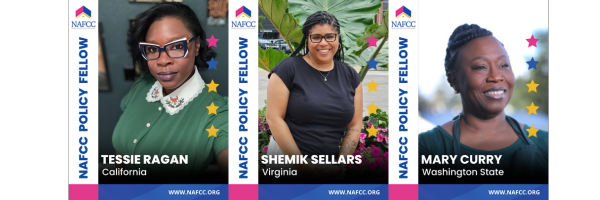
Announcing NAFCC Policy Fellows!
The National Association for Family Child Care (NAFCC) is proud to announce the newest cohort of our Policy Fellowship Program—a 8-month leadership opportunity designed exclusively for alumni of our Leaders Shaping Leaders (LSL) initiative.
This fellowship supports family child care educators in deepening their policy advocacy skills and gaining hands-on experience in policy analysis, advocacy, and coalition-building. Fellows will engage directly in shaping early childhood education policy at both the state and national levels, bringing the expertise of home-based educators to the forefront of decision-making spaces.
By investing in these leaders, NAFCC continues its commitment to advancing family child care through policy, power, and educator-led change.
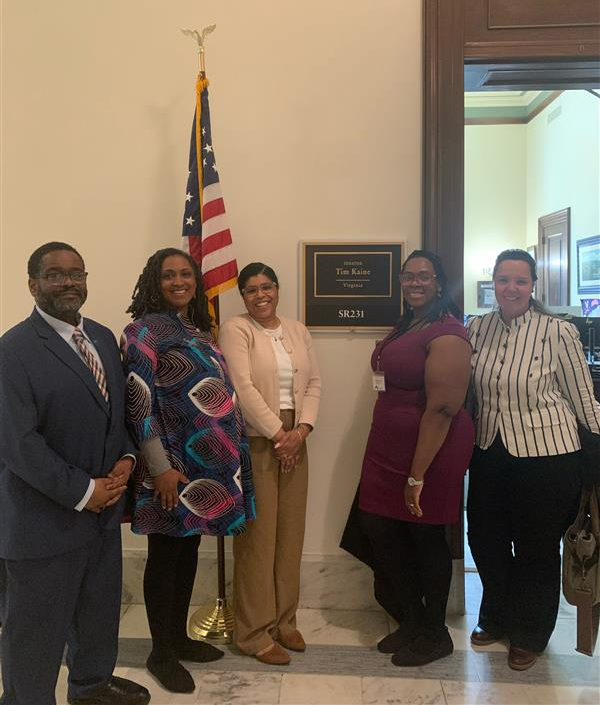
Advocacy is Action: NAFCC Joins Congressional Meetings Held in April
In April, NAFCC joined national partners in Washington, D.C., for a series of congressional meetings. Family child care voices were at the table, calling for bold federal investment in child care, home-based family child care educators, and the care infrastructure families rely on daily. NAFCC proudly uplifted the realities of FCC educators and reinforced the urgency for policies that value and sustain their work.

We Are Family Child Care Receives Regional Emmy® Nomination
We are excited to announce that We Are Family Child Care, a collaborative documentary by the National Association for Family Child Care (NAFCC) and Fola Studios, has been nominated for a Regional Emmy® Award in the Education/Schools category (Category #411) by the National Academy of Television Arts & Sciences (NATAS) Michigan Chapter. This nomination recognizes the film’s compelling portrayal of the dedication and impact of family child care educators.
Directed by Emmanuel Afolabi and photographed by Eugene Wilson V, the documentary highlights the essential role of family child care providers in nurturing and educating young children. The nomination underscores the importance of their work and the need for broader recognition of their contributions to early childhood education.NATAS Michigan
Interested in organizing a viewing party in your state? We encourage you to connect with your state representative or local affiliate to coordinate an event that celebrates this achievement and promotes awareness of family child care. For more information on the nomination and to view the full list of nominees, please visit the NATAS Michigan Chapter’s official page.
Join us in honoring the dedication of family child care educators and the recognition of their invaluable work through this prestigious nomination.

NAFCC Proudly Supports Day Without Child Care
The National Association for Family Child Care (NAFCC) proudly supports Day Without Child Care, a national day of action organized by Community Change and partners across the country. This movement brings together providers, families, and advocates to demand a child care system that is equitable, accessible, and truly values the work of caregivers.
To support this effort, NAFCC provided $500 microgrants to family child care educators leading local advocacy across the country. These funds helped educators organize events, close their programs in protest, and amplify the essential role of home-based care in their communities.
Through direct investment in educator leadership, NAFCC stands in solidarity with the movement to build a child care system that works for everyone.
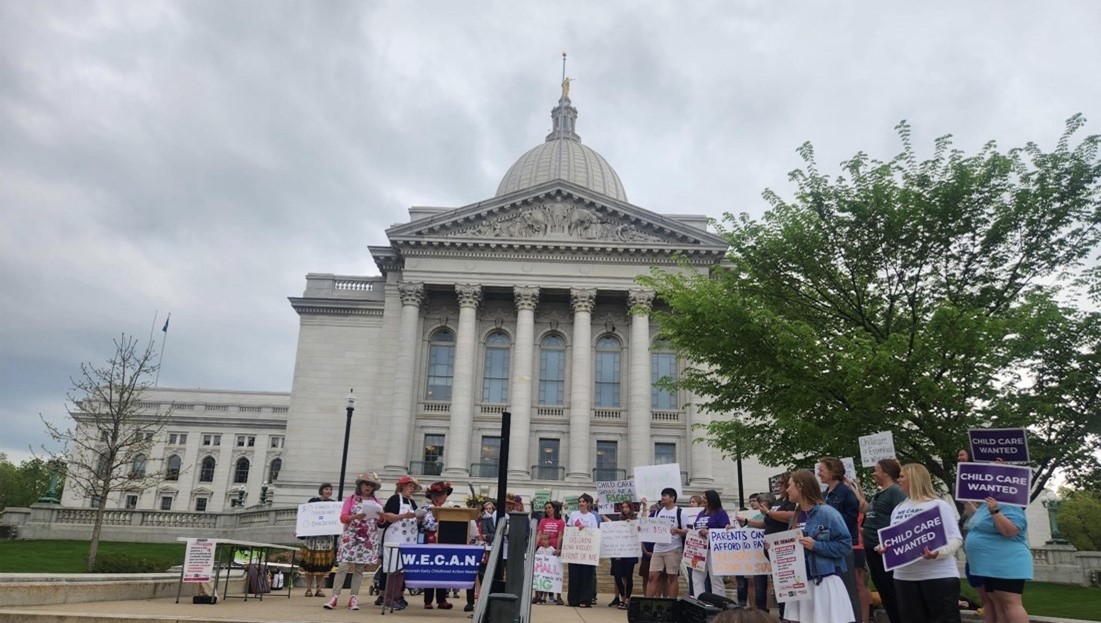
“We’re Done Waiting”: Wisconsin Educators Initiate Statewide Child Care Strike
On Tuesday, May 13, early childhood educators across Wisconsin shut down their doors to take their fight for child care funding to the state capitol. Their demand: restore the $480 million in child care funding cut from the state budget.
Corrine Hendrickson from Corrine’s Little Explorers in New Glarus, WI said “While politicians negotiate over our funding and our lives, Wisconsin working families are once again left without. We’ve done everything we were told to do. We called. We showed up. We shared our stories. And still, lawmakers voted to cut child care from the budget. No plan. No replacement. No respect. We’ve had enough and we are drawing the line.”
Read NAFCC’s statement here.

Join the Movement – DCFCCA Walk for Family Child Care
The DC Family Child Care Association (DCFCCA) is stepping up for equity and awareness through its biennial Walk for Family Child Care. This 5K walkathon brings together educators, families, and supporters to honor the vital role of home-based child care in Washington, D.C. This powerful event raises funds to support family child care providers and shines a spotlight on their essential contributions to early learning. Learn more here.

Proposed Federal FY2026 Budget: Limited Support for Family Child Care – Take Action Now!
The proposed FY2026 federal budget is a silent but serious threat to family child care.
Once again, home-based child care is left out—no mention, no investment, no accountability. This silence is not neutral. It’s systemic, and it’s dangerous.
Family child care educators are essential. They care for millions of children, support working families, and anchor local economies. Yet this budget proposal disregards their labor, their infrastructure, and their communities.
Read NAFCC’s official response:
NAFCC Statement on the FY2026 Budget – A Silent Threat to Family Child Care
Take Action Now
Share this statement with your networks
Tag policymakers and demand answers
Use your voice to call out the erasure of family child care
NAFCC will not stay silent. We will not be erased. And we are not alone.
Raise your voice. Demand better. Stand with family child care. : ACT NOW

